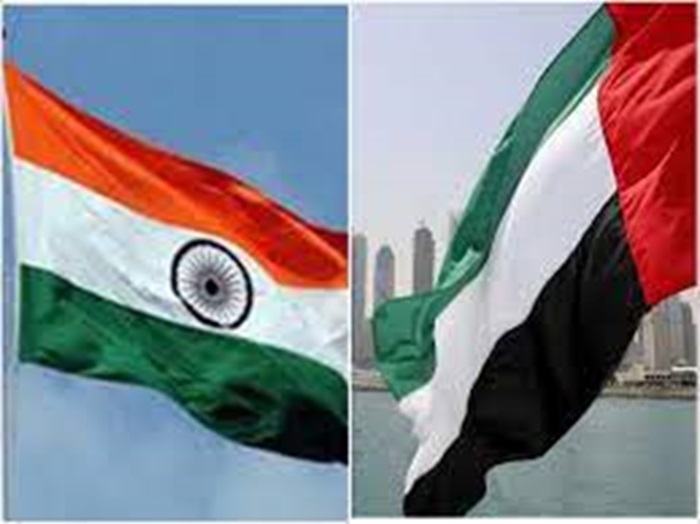
Prime Minister Narendra Modi will grace the inauguration of the Bochasanwasi Akshar Purushottam Swaminarayan (BAPS) Sanstha temple in Abu Dhabi, the capital of the United Arab Emirates, next February. This invitation is extended by representatives of the BAPS organization led by Swami Ishwarcharandas and Swami Brahmaviharidas that marks a significant moment for the Hindu community in the UAE.
Set to bloom amidst the desert sands, the BAPS Sanstha temple will be a breathtaking masterpiece reminiscent of a blossoming lotus flower. As the largest Hindu temple in the UAE, it will stand as a testament to the vibrant faith and rich cultural heritage of the Indian diaspora in the region. The temple’s intricate design, crafted with traditional hand-carved stonework from India, promises to be a visual spectacle. Its serene ambience will offer a haven for prayer, meditation, and spiritual rejuvenation, fostering a deeper connection between the faithful and their divine.
Beyond its religious significance, the BAPS Sanstha temple also symbolizes the strong bonds of friendship and mutual respect between India and the UAE. Prime Minister Modi’s acceptance of the invitation underscores this deep-rooted connection, further strengthening the ties between the two nations. A mosaic crafted from ancient threads of culture, religion, and trade binds India and the United Arab Emirates in a warm friendship. This kinship was nurtured for centuries and blossomed further with the rise of Sheikh Zayed bin Sultan Al Nahyan in 1966 and the subsequent formation of the UAE in 1971. Since then, both nations have dedicated themselves to strengthening their ties across all avenues, weaving a vibrant partnership that continues to flourish.
Earlier, on December 1st, amidst the buzz of COP-28 in Dubai, Prime Minister Narendra Modi and President Sheikh Mohammed bin Zayed Al Nahyan of the UAE co-hosted a high-level event on the innovative “Green Credits Programme.” Joining them were dignitaries like Prime Minister Ulf Kristersson of Sweden, President Filipe Nyusi of Mozambique, and President Charles Michel of the European Council. This event witnessed Prime Minister Modi extend a warm invitation to all nations to embrace this groundbreaking initiative.
The Green Credits Programme represents a novel approach to combating climate change, aiming to incentivize voluntary actions that benefit the planet. It envisions rewarding the green-minded efforts of individuals and organizations, particularly through issuing credits for planting trees on barren lands, reforesting river basins, and breathing life back into natural ecosystems. To further bolster this vision, a dedicated web platform was launched alongside the event, acting as a central repository of policies and best practices that motivate and guide environment-friendly undertakings. By fostering collaboration and providing tangible rewards, the Green Credits Programme promises to pave a greener path for the future.
On September 9, 2023, His Highness Sheikh Mohamed bin Zayed Al Nahyan, the President of the UAE, participated actively in the 18th G20 Summit held in New Delhi, India, under the leadership of Prime Minister Narendra Modi. This summit gathered leaders from G20 nations, European Union officials, representatives from international organizations and UN bodies, and various country delegations. The summit’s inaugural session, themed “One Earth,” concentrated on the collective global responsibility to protect the planet and its resources, emphasizing the urgent need for collaborative action on climate issues.
Prime Minister Narendra Modi warmly welcomed His Highness to the summit venue, and expressions of appreciation were conveyed for India’s adept organization and hosting of the summit. The success of the G20 process during India’s presidency was acknowledged and applauded.
His Highness Sheikh Mohamed bin Zayed Al Nahyan’s participation at the G20 Summit signifies more than customary diplomatic engagement. It epitomizes the strengthening relations between India and the UAE, highlighting their joint commitment to global responsibilities. The summit stood as a robust testament to the developing strategic partnership and amplified diplomatic collaboration between the two nations, particularly evident in discussions centred on environmental protection and climate resilience.
In this significant gathering, His Highness’s presence reflects a unified stance with global leaders, indicating a profound collaborative spirit focused on fostering worldwide sustainable development, innovation, and inclusive growth. This reaffirms the India-UAE relationship as a substantial force in shaping a resilient and prosperous future on a global scale.
His Highness Sheikh Mohamed bin Zayed Al Nahyan’s participation alongside global leaders underlines the depth and strength of the burgeoning bond between India and the UAE. It signifies a pivotal moment poised to drive transformative change and define a future characterized by shared aspirations, mutual respect, and steadfast collaboration on the global platform.
The UAE is today India’s third-largest trading partner and second-largest export market. The volume of trade between them is expected to from $ 60 billion in 2019-2020 to $ 100 billion in the next 5 to 8 years. Indian External Affairs Minister S Jaishankar observed in December, 2022, that more Indian citizens live in the UAE than in any other country abroad. Earlier, in February, 2022, India and the UAE signed UAE-India Comprehensive Economic Partnership Agreement (CEPA). The two countries have known and engaged with each other for a long time, but the quality of their ties has seen a distinct improvement since 2016, and With CEPA, it has scaled an unprecedented height. When Indian Prime Minister Narendra Modi went to the UAE in 2015, it was a visit by an Indian premier after more than four decades. The visit has since produced a veritable transformation in India-UAE relations.
India and the UAE signed a Comprehensive Economic Partnership Agreement (CEPA) on February 18, 2022 during the virtual summit attended by President of the UAE Sheikh Mohamed bin Zayed Al Nahyan and Indian Prime Minister Narendra Modi. The India-UAE CEPA is the India’s first bilateral trade agreement in the MENA region and the first bilateral trade accord concluded by the UAE. It is a wide-ranging agreement, covering all aspects of India’s economic engagement with the UAE, including Trade, Investments, Digital Trade Government Procurement, IPR Healthcare, etc.
The stellar rise in overall growth in bilateral trade is a reflection of the early gains flowing from the agreement. Between April and November 2022, the bilateral trade between the two countries has grown to $57.8 billion from $45.3 billion same period last year, marking an impressive growth of 27.5 per cent in percentage terms and a noticeable increase of $12.5 billion in value terms.
India and the UAE are seeking to expand their trade beyond traditional commodities. This diversification will not only open new avenues for cooperation but also increase the use of local currencies for transactions. Additionally, the India-Middle East-Europe Economic Corridor, established through a recent MoU, holds promise for reduced shipping costs and smoother flow of goods and services. This optimism was further echoed by the recent approval for exporting 75,000 tonnes of non-basmati white rice from India to the UAE, highlighting the popularity of Indian rice for its exceptional quality and taste.
As winds of change sweep through the India-UAE trade landscape, a surge in local currency transactions emerges as a powerful harbinger of a new era. This burgeoning trend reflects a shared commitment to deepen economic bonds by shedding reliance on foreign currencies. Streamlined processes, slashed transaction costs – these are the promised fruits of this shift. Envisioning a future where Dirhams and Rupees dance harmoniously across diverse trade channels, both nations are actively fostering direct exchange rates, facilitating swift settlements, and incentivizing local currency use. This strategic move promises not only flourishing bilateral trade but also enhanced direct investments and smoother financial transfers.
The Central Bank of the UAE (CBUAE) and the Reserve Bank of India (RBI) have crafted a framework through MoUs to prioritize national currencies in commercial transactions. This shift promises a fourfold dividend: it bolsters the foreign exchange market, simplifies bilateral trade, encourages direct investment, and lays the groundwork for sustained economic growth and financial stability. But the vision goes beyond immediate benefits. Recognizing the potential of diversified trade, both parties are actively discussing the inclusion of mutually advantageous commodities, further enriching the scope of economic cooperation and enhancing the versatility of local currency transactions.
The UAE-India Comprehensive Economic Partnership Agreement (CEPA) marked a pivotal moment for both nations. Not only was it the UAE’s first such agreement, but it also laid the foundation for a dynamic new approach to foreign trade. By slashing tariffs on over 80% of goods, the CEPA fostered an enabling environment for business, paving the way for seamless collaboration between small and medium-sized enterprises (SMEs) and enhanced mutual investments in key sectors.
This economic pact signifies a deepening bond between India and the UAE, where both parties are steadfast in their pursuit of sustainable growth. The UAE-India CEPA Council (UICC) serves as the cornerstone of this collaborative spirit, acting as a dedicated platform for business-to-business interactions. With a particular focus on MSMEs and start-ups, the UICC aims to optimize CEPA’s benefits, strengthening economic ties and building lasting synergies. By streamlining activities through the council and its established committees, India and the UAE are poised to unlock the full potential of this transformative agreement.
In a landmark effort to bolster food security across South Asia and the Middle East, the I2U2 grouping – composed of India, Israel, the United Arab Emirates, and the United States – has made significant strides. The I2U2 is a small multilateral or minilateral group of Israel, India, USA and UAE which aims to increase joint investments in water, food security, transportation, energy, health and space. Unencumbered by the complications of decision-making and institutional constraints of larger organisations, minilaterals (involving three to nine countries) offer greater flexibility, select membership, informality, and a goal-oriented focus. This shift towards minilaterals is prompted by the growing importance of geo-economics, which is shaping the way countries collaborate and form alliances to further their economic interests. By focusing on shared economic interests, member countries are able to forge trust, overcome political differences, and evolve an expansive agenda for cooperation that combines geopolitics and geo-economics.
The I2U2 group works together in solar and wind energy, coordinating efforts to fight climate change and rail transport infrastructure. One of the main objectives of the group is to improve food security following the Russia-Ukraine war, which had been impeding Ukraine’s efforts to export food grains. The four countries also discuss trade and investment and cultural and educational ties, and explore private sector involvement. The latest high-level meeting to accelerate bilateral economic cooperation and engagements under the India, Israel, US and UAE grouping (I2U2) was held in Abu Dhabi earlier this week.
The UAE’s generous $2 billion investment will establish a network of cutting-edge food parks in India, utilizing the expertise of US and Israeli private sectors. These technologically advanced hubs will not only alleviate food shortages but also embrace sustainability through pioneering advancements in reducing waste, conserving water, and harnessing renewable energy. This collaborative initiative marks a promising step towards a more secure and resilient food future for both regions.
Earlier in March, foundations were laid for a 1 million square feet Mall to be developed by the Emaar Group in Srinagar. Speaking on the occasion, the Lieutenant Governor of Jammu and Kashmir, Manoj Sinha, described it as the first Foreign Direct Investment (FDI) project in Jammu and Kashmir. A total of INR 250 crores will be invested in the development of the Mall. The Emaar group has received two more plots of land in Srinagar and Jammu respectively, where they proposed to build IT towers. INR 150 crores will be invested in the construction of each of these towers. The Emaar group has already committed to making an investment of 500 crores in the Union Territory. The Mall would be ready for business by 2024. In conclusion, the forthcoming inauguration of the BAPS Sanstha temple in Abu Dhabi by Prime Minister Narendra Modi stands as a manifestation of the flourishing India-UAE ties. Beyond its magnificence, this temple embodies the cultural richness of the Indian diaspora and symbolizes the enduring bond between both nations. Its unveiling marks a pivotal moment, echoing a commitment to mutual respect and fostering a vibrant partnership. As India and the UAE forge ahead, their journey signifies a shared destiny shaped by deep-rooted connections and a collective pursuit of progress and collaboration on the global stage. (Financial Post)


